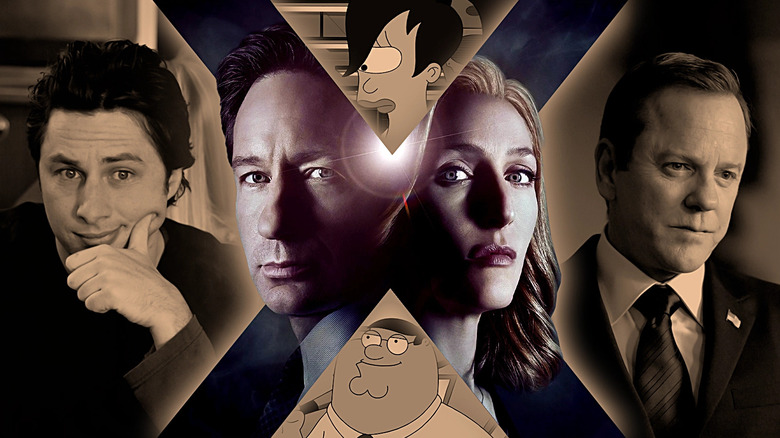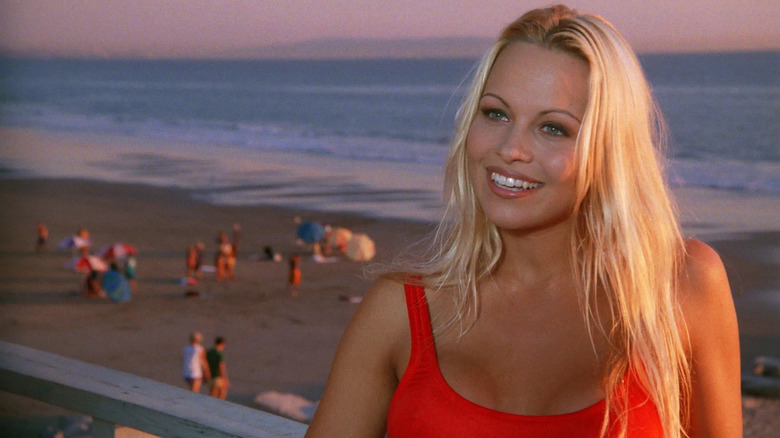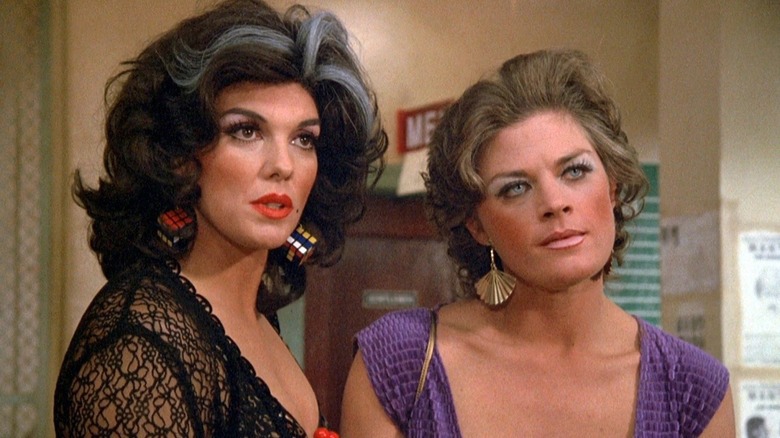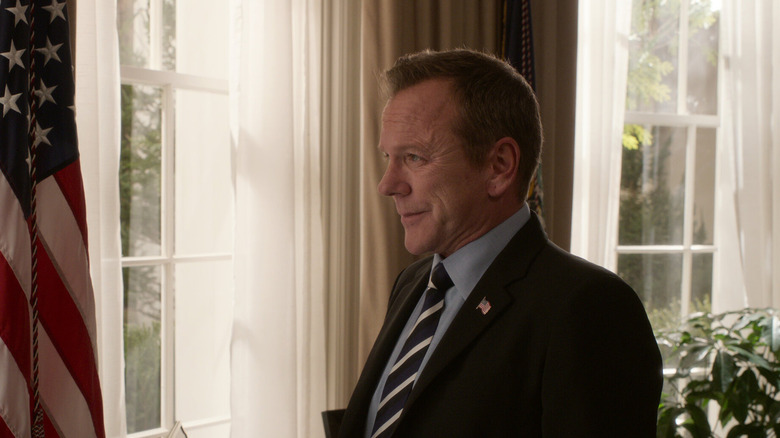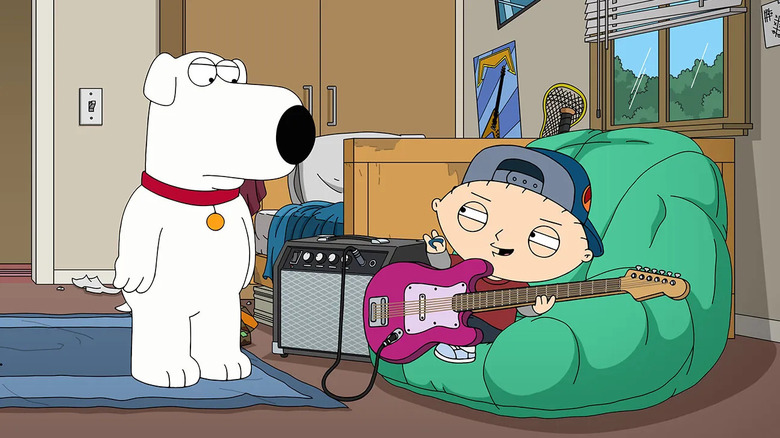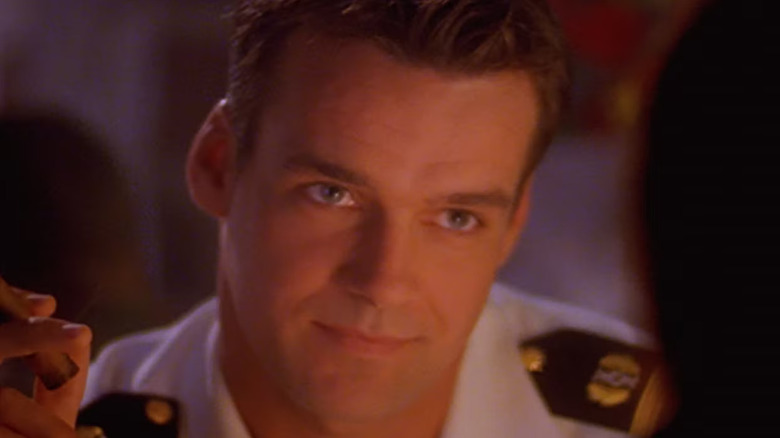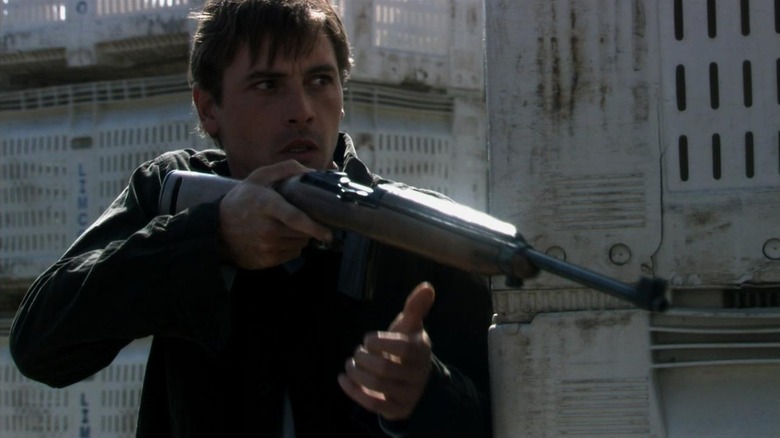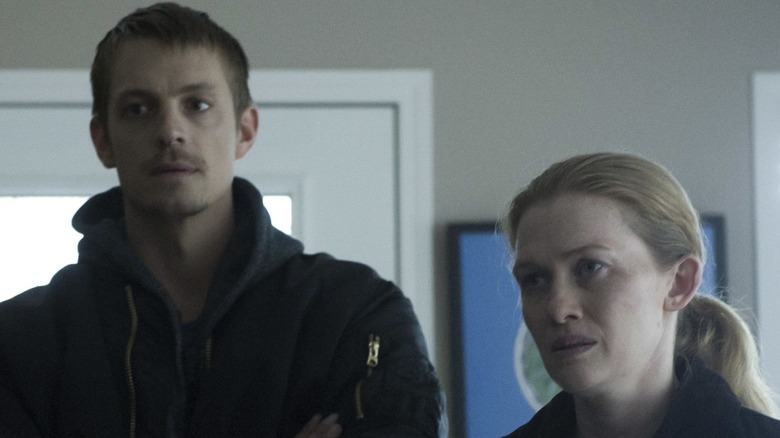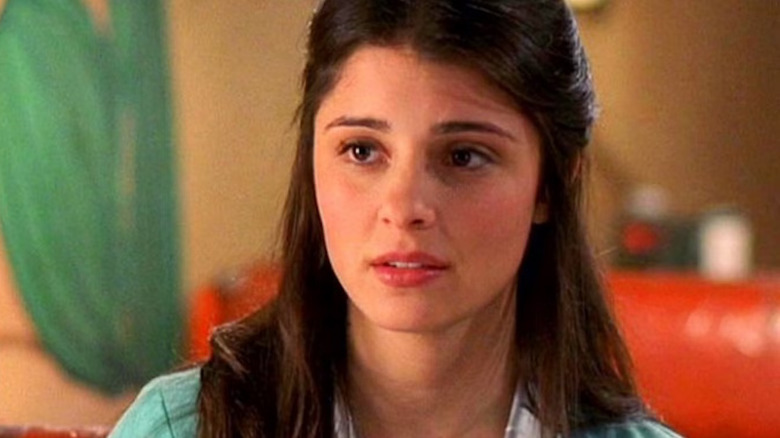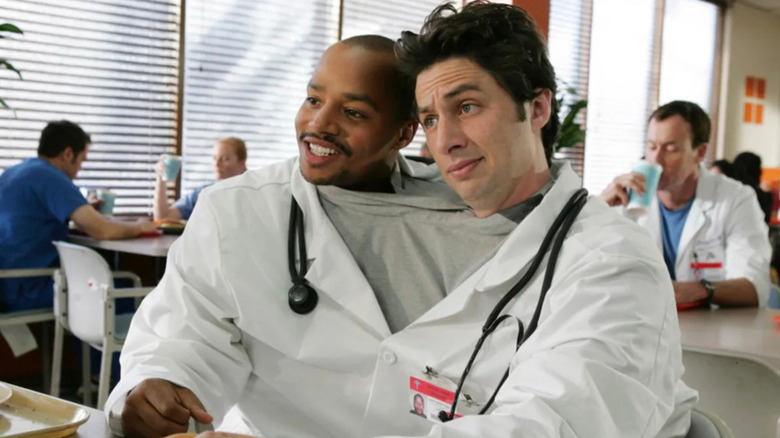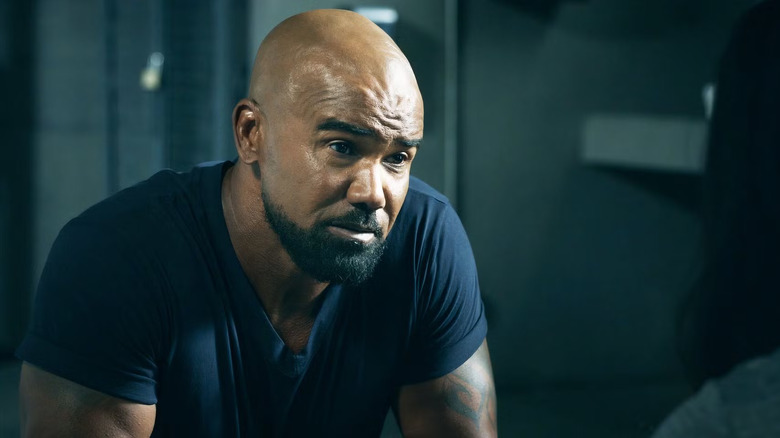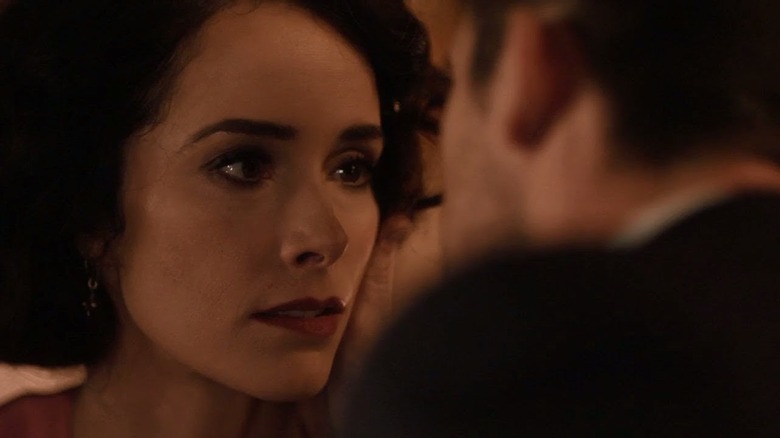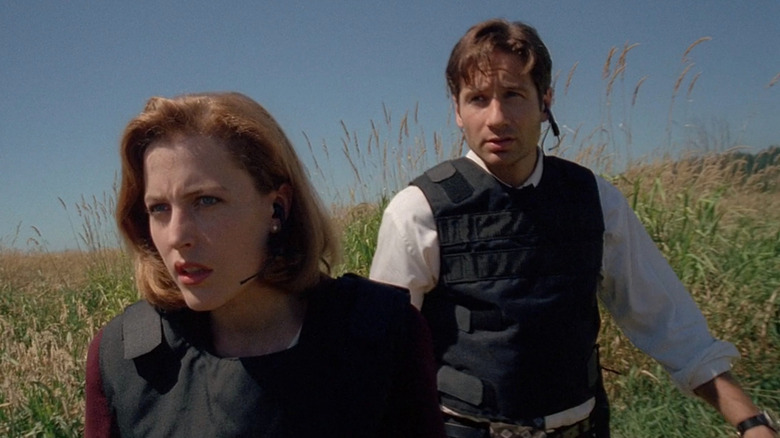15 TV Shows That Were Canceled Multiple Times
To be a television fan is to accept anxiety and heartbreak at some level. Since the beginning of the medium (and especially now with streaming services), every TV show's future, no matter how seemingly beloved, is at the mercy of studios, production companies, and advertisers. I've experienced many shows I adored get canceled without mercy, and I'm sure you have, too.
But in a few instances — increasingly so in the era of specialty reruns, streaming, and revival-mania — these cancellations are reversed. Hallelujah, your show is saved! But then, and here's where it gets really heartbreaking, this revival is reversed, resulting in yet another cancellation! Does anyone have an antacid?!
To, uh, "celebrate" this strange facet of TV, let's look at 15 TV shows that were canceled multiple times. Some got proper finales, some were cut short with no resolution, and some are still on the air to this day. All make for interesting case studies of the particular peculiarities of the boob tube.
7th Heaven
"7th Heaven" was the second coming of the after-school special, a family drama about Protestant minister father Eric Camden (Stephen Collins, a man whose personal life you should not Google) and his family with seven children. The brood, which also featured up-and-coming stars like Jessica Biel, dealt with issues like drugs, premarital sex, and bullying, all tempered by an ever-present relationship with a particularly milquetoast conception of God.
Originally airing on the WB from 1996 through 2006, the network canceled the show after its 10th season, citing rising costs and lowering ratings. Garth Ancier, a WB executive at the time, said the series lost $16 million in 2005, which is about $26 million in 2025 money. "As much as we all love the show, we do have to run a business," said Ancier in a press release, something no gentle sermon can circumvent.
But when the WB merged with UPN to make the CW later that year (a network currently going through another big change), "7th Heaven" was revived and given an 11th season. And when that season ended, the CW axed it again, putting it to bed for good.
Baywatch
You know the stars, iconography, and campiness of "Baywatch," one of the 20th century's most famous and influential television shows. Led by stars like David Hasselhoff and Pamela Anderson, "Baywatch" is about a crew of incredibly attractive lifeguards on the beaches of Los Angeles (and for a couple of seasons, Hawaii) who save potential drowners while dealing with all kinds of interpersonal drama. Red swimsuits, slow-motion running — it's "Baywatch," the smash hit TV show we all know and love!
But it didn't start as a smash hit. It originally debuted on NBC in 1989 before being canceled after just one season, partially because of the large per-episode costs (about $1.25 million, or $2.1 million in 2025) and partially because its production company, GTG, was about to fold. However, the show did incredibly overseas, spurring the producers (including Hasselhoff himself) to reduce costs and make deals to film more episodes of "Baywatch" directly into worldwide syndication. The show then ran for 10 more seasons, becoming at one point the most-watched show across the globe.
For its final two seasons, the show shifted locations and rebranded as "Baywatch: Hawaii," getting canceled for good in 2001. And the less we mention its bizarre spin-off, the better.
Cagney & Lacey
"Cagney & Lacey" is a benchmark for a certain kind of populist feminism as seen in mass media, a CBS cop procedural with two female leads and a surprising (and silly) amount of controversy among its multiple cancellations and revivals.
After a pilot movie aired in 1981 (a common practice for TV shows of that era), the first six-episode season aired in 1982, starring Meg Foster as the single Detective Christine Cagney and Tyne Daly as the married Detective Mary Beth Lacey. Beyond this first season's low-ish ratings, both women were uncommonly frank, leading to sexist scuttlebutt among both TV execs and critics. CBS canceled the show, riling up executive producer Barney Rosenzweig to get them to change their minds.
And then, a CBS exec told the press in a public forum that part of the reason for cancellation was that the leads reminded him of, well, a slur reserved for lesbian women. Uproar was immediate, leading to a last-minute revival of the series, with Sharon Gless stepping in as Cagney and some "softening" changes made to her character. But the show was canceled yet again after season 2! And after another fan outcry plus rising ratings post-time slot move, CBS renewed it again, where it stayed on the air until 1988, wrapping up after a total of seven seasons.
Designated Survivor
Kiefer Sutherland, known by many as a complicated geopolitical thriller lead from "24," starred in the title role on "Designated Survivor." Thomas Kirkman instantly becomes the President of the United States after an explosion during the State of the Union kills everyone else in the line of succession, and he must deal with countless ramifications and threats in the aftermath.
The series aired for two seasons on ABC, enjoying a burgeoning fan base. So why was "Designated Survivor" canceled? Reports emerged, painting a picture of behind-the-scenes turmoil, including a high turnover of showrunners and an increasingly unhappy Sutherland. These difficulties, combined with decreasing ratings, led ABC to cancel the series after season 2.
But Netflix, that ubiquitous streaming service, picked up the show for a third season, decreasing its episodes from 22 to 10 and focusing the often tumultuous plotlines onto a campaign storyline for Kirkman. Despite this renewed interest, Netflix canceled the show for the final time after this season, with reports later detailing that its actors only signed a one-season contract, and negotiations were becoming too complex to justify the investment.
Family Guy
"Family Guy" started a TV empire for creator/star Seth MacFarlane. The animated sitcom features Peter Griffin (MacFarlane), the boorish patriarch of an eccentric family in the town of Quahog, Rhode Island. The show pushes the boundaries of both good taste and comedic sensibilities, satirizing all matters of taboo topics and codifying our contemporary understanding of the "cutaway joke" as a mode of expression.
When it originally aired in 1999, it garnered attention, controversy, and decent ratings in its post-"Simpsons" time slot. But after another season of shifting slots and declining ratings, Fox canceled the show in 2000. The network then reversed that decision, ordering a third season just a couple of months later! But that season also suffered from low ratings and split attention, leading Fox to cancel it, again, in 2002.
These three seasons' rerun rights were then sold to Cartoon Network, which made it a cornerstone of their burgeoning late-night Adult Swim block, offering cartoons for, well, adults. There, the show became a colossal cult hit, besting other late-night offerings in key demographics. This success, combined with exceptional DVD sales of the seasons, prompted Fox to renew the series again in 2004, and MacFarlane has made his feelings about any future cancellations known.
Futurama
"Simpsons" masterminds Matt Groening and David X. Cohen originally brought the sci-fi silliness of "Futurama" to Fox in 1999. The show features Philip J. Fry (Billy West), a dimwitted pizza delivery boy who falls into a cryogenic freezing pod and wakes up in the year 3000. There, he meets a crew of intergalactic delivery workers and forges a new family, especially with cyclops Leela (Katey Sagal), his eventual love interest.
"Futurama" originally aired for four seasons, and despite Fox's shifting timeslots and seeming lack of interest in the program, it earned huge acclaim for its uncommonly intelligent depictions of scientific concepts in the guise of abject silliness. But during the middle of season 4's production, Fox simply stopped ordering episodes, effectively cancelling it.
Similarly to "Family Guy," however, "Futurama" found a second life in Adult Swim reruns and DVD box sets (including four original straight-to-DVD films, later recut as the show's "fifth season"). When syndication rights shifted to Comedy Central, its success led that network to order an official revival of the series. But after season seven aired on Comedy Central, the show was canceled once again in 2013 — until Hulu, 10 years later, revived it once more. Thus, the show has technically ended four times, and each ending is about the same thing.
JAG
One of the best military TV shows of all time, "JAG" follows the exploits of the U.S. Navy's Judge Advocate General Corps. Harmon Rabb (David James Elliott) leads a cast full of Naval officers interested in pursuing due process and justice, combining the best genre pleasures of military dramas and legal dramas. Basically, if you want "A Few Good Men" as a TV procedural, "JAG" is your show.
"JAG" originally aired on NBC in 1995, before getting canceled by the peacock network after its first season had dwindling ratings. CBS then picked up the show as a midseason replacement. From that point on, the ratings kept climbing as it became one of CBS's most beloved shows. Then, CBS canceled the show in the middle of its 10th and final season, leading to its final, ambiguous episode serving as its series finale.
Beyond its 10-season run, "JAG" is also known as the launchpad for the successful and lucrative spinoff series "NCIS," a flagship empire for CBS. In other words, in the case of NBC vs. CBS, the court rules in favor of the Tiffany Network.
Jericho
CBS' "Jericho" was an underrated post-apocalyptic sci-fi series about the small town of Jericho, Kansas, and the aftermath of a coordinated nuclear attack on the United States. Skeet Ulrich leads the cast as prodigal son Jake Green, and the ensemble deals with all matters of maneuvering and intrigue, including the eventual formation of new governments under the most trying of circumstances.
As season 1's ratings kept dropping during its 22-episode run, CBS canceled the show in 2007. But the response from its passionate fanbase was swift and loud, including the shipping of 50,000 pounds of peanuts to CBS's New York headquarters, a reference to an evocation in the season 1 finale. Finally, perhaps tired of receiving ample legumes, CBS announced "Jericho" would return for a midseason second season of seven episodes, with a possible extension based on ratings.
The ratings, unfortunately, remained unsatisfactory, and CBS axed the show for good in 2008. "Without question, there are passionate viewers watching this program," said CBS Entertainment President Nina Tassler. "We simply wish there were more."
The Killing
Based on a Nordic noir show, "The Killing" is a moody piece of prestige crime television, following two morose Seattle detectives (Mireille Enos and Joel Kinnaman) as they investigate several murder cases. It's a foggy, bleary, dreary, and wholly unsettling watch.
After airing two seasons on AMC, the basic cable network announced in 2012 that it was cancelling "The Killing." But its production company, Fox Television Studios, worked hard at renegotiating a more advantageous deal, cutting in Netflix to earn the streaming rights after airing terrestrially. Thus, AMC brought "The Killing" back for a third season after all!
But after that season, well, AMC canceled it yet again. And yet again, it was resurrected from the dead, with Netflix itself commissioning and airing a fourth and final season of "The Killing."
Of the bumpy road to a fully concluded, four-season arc, Fox Television Studios President David Madden said, "It's a true testament to [showrunner] Veena Sud, and the stellar cast led so compellingly by Mireille Enos and Joel Kinnaman, that fans remained so passionate about the show."
Nashville
"Nashville," while unrelated to the Robert Altman film of the same name, was still a compelling and soapy drama set in the world of country music. It deals primarily with the friction between respected but fading country icon Rayna James (Connie Britton) and rising pop-country superstar Juliette Barnes (Hayden Panettiere).
ABC aired four seasons, with the season 4 finale ending on a particularly nasty cliffhanger. But despite signs of a renewal, including the hiring of new showrunners, the network opted to cancel the show instead. Fans quickly mounted a revival campaign, the flames of which were fanned by Nashville's production company, Lionsgate TV. And lo and behold, the country gods listened. Specifically, Country Music Television, or CMT, ordered two more seasons of "Nashville" before its ultimate cancellation and closure in 2018.
For those itching for more "Nashville," there's still a flicker of hope. In 2019, it was announced that the show would be adapted into a Broadway musical by mega-producer Scott Delman ("The Book of Mormon"). However, no real updates have been announced since.
Roswell
TV guru Jason Katims ("Friday Night Lights") adapted the book "Roswell High" into cult sci-fi show "Roswell," which presents an alternate kind of history where the infamous aliens allegedly discovered in Roswell, New Mexico, were alive, walking around, and hidden in the guise of three high schoolers (Jason Behr, Brendan Fehr, and Katherine Heigl). When discovered and kept secret by Liz Parker (Shiri Appleby), complications ensue, combining teen drama with speculative science fiction.
After the finale of season 2, which was marked by some creative changes behind the scenes, including the hiring of sci-fi vet Ronald D. Moore as showrunner, the WB canceled "Roswell." However, its production company, 20th Century Fox, persuaded UPN to include a renewal of "Roswell" as a package deal alongside their acquisition of "Buffy the Vampire Slayer."
UPN then aired season three of "Roswell" directly after "Buffy." It became a totally different series after changing networks, but it didn't result in better ratings, and the show was dropped again.
Scrubs
Influential and beloved, Bill Lawrence's sitcom "Scrubs" follows J.D. (Zach Braff) and his staff of fellow doctors and nurses as they struggle with patients, personal problems, and love. The show brought a certain kind of sensitive dramedy tone to the forefront of television, while also expanding the form's patience for surrealism (though it was never expected to get that weird).
The seventh season of "Scrubs" was marked by behind-the-scenes conflict, especially given the stressful circumstances of the Writers' Guild strike. When all the dust settled, NBC announced it was canceling the series. Rival network ABC then picked up an eighth season as a midseason replacement. And while Lawrence conceived this as the last hurrah, going so far as to title its finale "My Finale" and showing closure for J.D., ABC ordered a ninth season with format and cast changes that effectively made it a soft reboot starring a new group of residents.
But this new version of "Scrubs" didn't catch fire, and ABC officially canceled the series after that season. As Braff himself said on Facebook, "It appears that 'New Scrubs', 'Scrubs 2.0', 'Scrubs with new kids', 'Scrubbier', 'Scrubs without J.D.' is no more. It was worth a try, but alas... it didn't work."
S.W.A.T.
A reboot of the beloved 1970s series of the same name, "S.W.A.T." followed the exploits of, well, a SWAT team in Los Angeles, led by Sergeant Daniel "Hondo" Harrelson (Shemar Moore). Shawn Ryan helped develop the new version of the crime show, canonically crossing it over with his other, gritty police drama, "The Shield," and giving it all a more authentic sheen.
After six seasons on CBS with steadily climbing ratings, it was axed in 2023 because CBS and production company Sony TV couldn't come to an economically agreeable licensing deal. But then, just a few days later, CBS announced it was un-cancelling "S.W.A.T.," ordering a seventh and final season.
And then, after that allegedly final season aired, CBS ordered yet another season of the show, which CBS President Amy Reisenbach called "a good dramatic twist." But its ninth season would ultimately be its last, with CBS' grand total of cancellations coming in at three.
Timeless
Another jawn co-created by Shawn Ryan, "Timeless" follows Professor Lucy Preston (Abigail Spencer) and her team of specialists that form a team called "Lifeboat." This Lifeboat's mission? To travel through time and stop a mysterious organization with designs to damage history irreparably — which includes the fun twist of casting historical figures.
As you might be learning by reading this list, high-concept sci-fi shows are ripe for "cult TV with a passionate but small fanbase that gets lots of cancellations and revivals," and that's exactly what happened to "Timeless." The first NBC axe fell after its first season, due to struggling ratings and a lack of financial feasibility.
But then, a few days after its 2017 cancellation announcement, NBC, well, changed the course of history and ordered a second season after all. Ryan and co-creator Eric Kripke ("The Boys") promised a more family-friendly focus in their second season, and NBC promised to shift the show into a friendlier timeslot. But sometimes, time is a flat circle. NBC canceled the show again after season 2, even after it ended on a massive cliffhanger. This time, however, a lifeboat was quickly given; NBC ordered a two-part finale movie for a proper conclusion.
The X-Files
"The X-Files" is one of my favorite shows, an iconic piece of genre storytelling featuring Agents Fox Mulder (David Duchovny) and the more skeptical Dana Scully (Gillian Anderson) uncovering all kinds of spooky occurrences, some self-contained, and some tied to a broader conspiracy — though most of the best "X-Files" episodes are the former.
Duchovny left "The X-Files" as a main cast member at the end of season 7, and the show did its best to move on with Robert Patrick taking his position for two seasons, before Fox announced its cancellation after season 9.
This season, and its first stab at a series finale, felt completely "off" to most viewers, which made its later-period season 10 revival in 2016 feel like a burst of cautious optimism. Fox ordered another season to air in 2018, before cancelling it once again, ending it on another sourly received finale. Could the truth still be out there? Or are some stories too weird to actually end?
